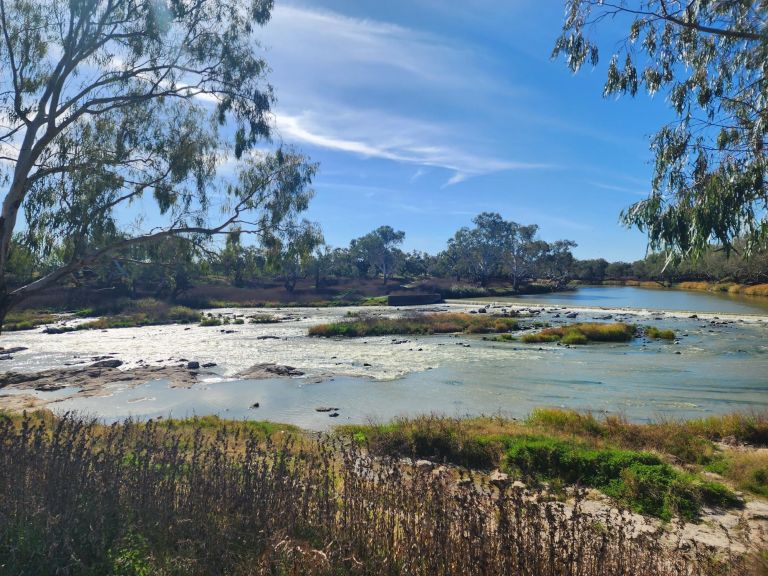2023-24 Safety and Quality Account Introduction
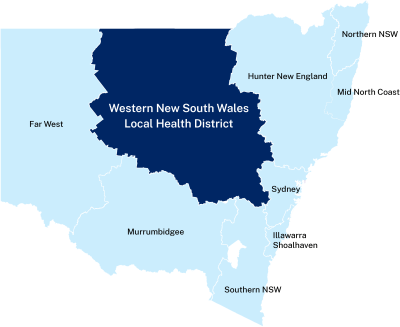
Western NSW Local Health District (WNSWLHD) is committed to improving the safety and quality of healthcare we provide across Western NSW.
The below information demonstrates this commitment and provides a snapshot of our achievements over the 12 month period.
Visit the About Western NSW Local Health District web page to learn more about our District.
"On behalf of Western NSW Local Health District (WNSWLHD), we are pleased to present our Safety & Quality Account for 2023-2024.
This year's Account reflects our unwavering commitment to safety and quality in all our initiatives. Our core values—Collaboration, Openness, Respect, and Empowerment—drive us to continually strive for the best outcomes for our patients and communities.
As we celebrate the milestones achieved over the past year and look forward to future goals, we remain steadfast in our vision of promoting healthier rural populations and vibrant communities. Our mission to deliver exceptional healthcare across Western NSW remains the cornerstone of our dedication.
Our focus on improving workplace culture has fostered a supportive environment that enhances patient care and staff satisfaction. We have also made strides in consumer and community engagement, working to empower the public in the planning, design, delivery, and evaluation of services.
As we mark key dates such as National Sorry Day, NAIDOC Week, National Reconciliation Week, and Human Experience Week, we reaffirm our commitment to reconciliation and cultural inclusivity.
In the past year, WNSWLHD has reached significant achievements, highlighted by:
- Recognition in the Quality and Safety Awards, showcasing our excellence in maintaining high standards of care.
- Accolades in the Nursing and Midwifery Awards, acknowledging the exceptional skills and dedication of our nursing and midwifery teams.
- Honors at the Excellence in Allied Health Awards, celebrating the outstanding contributions of our allied health professionals.
WNSWLHD extends heartfelt thanks to our dedicated staff, whose tireless efforts ensure the delivery of high-quality, safe healthcare services throughout our district. We look forward to another year of continued growth and success, driven by our collective commitment to exceptional care and community well-being."
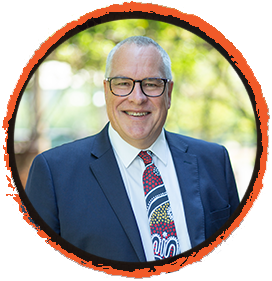
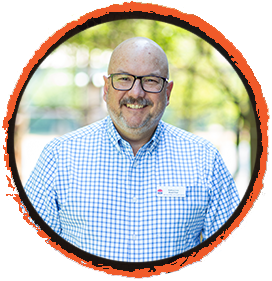
The 2023-2024 annual plan is WNSWLHD’s approach to delivering key priorities.
Directorates and teams are able to develop annual plans that link to the District plan and additionally reflect local team and directorate key priorities. Our annual plan has a clear focus on delivery and simplification to achieve real outcomes.
Review progress towards our annual actions below:
| Annual Action | Status |
|---|---|
| Implement the District People Strategy | Ongoing |
| Focus on delivering Aboriginal workforce initiatives in the People Strategy | Ongoing |
| Deliver the District Environmental Sustainability Strategy | Complete |
| Implement the Innovate Reconciliation Action Plan | Ongoing |
| Pilot sub-regional committees and place-based approaches in local communities | Complete |
| Fully operationalise the Service Improvement function within the Service Delivery directorate | Complete |
| Complete the implementation of the internal structures of the Service Delivery directorate | Ongoing |
| Develop the strategic approach to Whole of District Patient Flow and System Co-ordination, and commence implementation of identified year one priorities | Complete |
| Continue to implement the District’s Ageing Strategy with a specific focus on commencing the establishment of a District-wide Geriatric Medicine Service | Ongoing |
| Develop a five-year plan for maternity and children’s services | Ongoing |
| Undertake redesign and service improvements in outpatient medical services | Complete |
| Finalise the Dubbo, Wellington, Narromine Clinical Services Plan and the Orange Clinical Services Plan | Ongoing |
| Support community-based, locally led health promotion activities with a focus on Aboriginal people | Ongoing |
| Deliver on our extensive redevelopment program – Bathurst planning and design; Blayney design and into delivery; Cowra delivery, and delivery of Key Health Worker Accommodation | Ongoing |
| Implement the single employer model and/or pilot other primary care reform models in small towns | Ongoing |
| Deliver the Canowindra Health One | Ongoing |
| Establish the Rural Clinical Trials Support Unit (CTSU) | Complete |
| Recommitment to the patient pledge for better patient experience | Complete |
Related items
The Innovate Reconciliation Action Plan (RAP) June 2023 – June 2025 for WNSWLHD has been established to deliver a framework for non-Indigenous staff to build relationships with Aboriginal and Torres Strait Islander peoples, partner organisations, patients, families, and carers. WNSWLHD has committed within this action plan to work collaboratively to achieve the common goal of marked improvements of health outcomes for Aboriginal and Torres Strait Islander people.
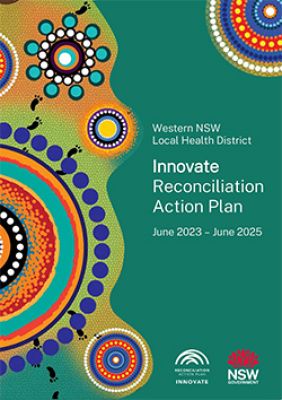
Fundamentals:
Our actions will be based on the fundamentals of opportunity, respect & relationships.
Our vision will become a reality by working together to create and maintain respectful relationships with Aboriginal and Torres Strait Islander people.
Key strategies:
We value the contribution of Aboriginal culture to people’s overall health and wellbeing, and we will ensure that Aboriginal patients, family, and carer experience is at the centre of what we do. We are committed to undertaking true co-design of services in partnership with Aboriginal people.
Acknowledgment of past actions:
To achieve this vision, we must accept and acknowledge past actions that have resulted in harm caused to the health and wellbeing of Aboriginal people, and the continued impact this harm has on Aboriginal people and communities today.
Our Achievements so far
- Introducing cultural protocols across all facilities and services.
- In 2024 WNSWLHD conducted a series of events to install plaques and posters of the NSW Health Apology across all major sites.
- Increasing Aboriginal and Torres Strait Islander staff employment from 3.4% in 2014 to 7.55% in 2024
- Increasing representation of Aboriginal and Torres Strait Islander staff in leadership roles.
- Refreshed and launched WNSWLHD face to face Respecting the Difference training.
- Holding regular activities to network with and support our Aboriginal and Torres Strait Islander staff.
- Hosting cultural immersion events including the Women’s Leadership forum and Sorry Day events.
- Development and implementation of Aboriginal marketing material to attract staff recruitment and retention.
- Development and implementation of Sorry Business sympathy cards.
- Facilitating cultural immersion experiences for our board and executive leadership team.
- Celebrating NAIDOC Week and Reconciliation Week across all facilities
- Delivering Aboriginal and Torres Strait Islander arts, signage, and cultural gardens to 21 facilities.
- The District has pledged a public statement of commitment to Reconciliation, and we have developed a successful Aboriginal School Based and Full Time Trainee program, with 17 indigenous school based students and 4 full time Aboriginal adult trainees employed in the last 12 months.
Related links:
Research ethics and governance:
- The Greater Western Human Research Ethics Committee (GWHREC) reviewed a total of 19 Greater Than Low Risk applications, with an average time between submission and final decision of 77.9 days (NSW state benchmark = 90 days) and 77 Low Risk Applications with an average time between submission and final decision of 48.8 days (NSW state benchmark = 60 days), indicating efficient ethical review processes available to staff and colleagues across the region.
- The research governance team authorized a total of 71 Site Specific Applications (SSAs), with an average total time between submission and authorization of 28.9 days (NSW State benchmark = 60 calendar days) of which only 10 days represented the handling time in the Research Office. This again indicates an increase in SSA submissions from the same period last year and reduction in combined time from Research Office, researchers and Heads of Department assisting projects to get off the ground in facilities.
- The Research Office supported a total of 29 GWHREC meetings in the last 12 months and provided ongoing support to ethics committee members. This included the annual in-person gathering held in Dubbo in March 2023.
- The Ethics Committee is in the process of applying to the National Health and Medical Research Council (NHMRC) for certification which will allow it to review applications for research taking place in other states under the National Mutual Acceptance (NMA) Scheme.
Research grants, output and other opportunities:
- Staff from the District were involved in a total of 86 peer-reviewed research publications; however, this total will likely change as publication in literature takes time.
- In the last 12 months, WNSWLHD staff submitted a total of 3 Expressions of Interest (EOI) in Round 8 Translational Research Grants Scheme (TRGS) grants and were invited to partner on an additional 12 TRGS EOI applications.
- WNSWLHD was successful in securing a Round 7 TRGS grant. Dr Jonathan Penm and Mr Brett Chambers – WNSWLHD
Project – Virtual Partnered Pharmacist Medication Charting (VPPMC) to improve medication safety. - Three WNSWLHD staff were accepted onto the 2023 HETI Rural Research Capacity Building Program participants – a key program to help build capacity and develop a research culture in the LHD.
Research education, training and advocacy
- The Research Office facilitates a monthly Virtual Research Interest Groups (VRIG) since 2019 attended by between 8-20 staff providing peer support, education and information about research processes in the LHD.
- WNSWLHD is a member of the Rural Research Collaborative Learning Network (RR-CLaN), which provides high-quality research education and training to healthcare staff working in rural, regional and remote areas. This network brings together 10 rural and regional LHDs from around NSW, plus 5 Health Networks from Far North Queensland, to share research knowledge through collaborative education, and has to date delivered sessions.
District Library Services:
- The District Library Service evolved from being base hospital services working in isolation to a District service in 2021 and continues to perform to a high standard for our staff, supplying 1637 articles and performing 115 literature searches during 2023-24.
- Library staff also provided 79 information education sessions for 208 staff and students covering a variety of clinical and research topics.
Clinical Trials Support Unit:
- NSW Health was awarded a $30 million clinical trials infrastructure grant to build clinical trial capacity in regional NSW and ACT. $18 million of this was allocated to establish a network of three cluster CTSUs to facilitate clinical trial delivery, providing high quality research support services, a Northern, Southern, and Western cluster.
- WNSWLHD celebrated the official launch of the Western Cluster Clinical Trials Support Unit (CTSU) on World Clinical Trials Day, 20 May 2024. The Western Cluster CTSU services WNSWLHD, Far West LHD and Nepean Blue Mountains LHD (Lithgow Hospital), supporting established and emerging Investigators by helping ease the administrative burden of starting, running and completing a clinical trial. The mission of the Western Cluster CTSU in Western NSW is:
- expanding and improving efficiencies in the delivery of tele-trials
- focusing on areas of need in the Western NSW region
- developing a local clinical trial capable workforce through mentoring, training and education, and
- leveraging partnerships with key stakeholders to rapidly increase clinical trial activity.
- Western Cluster CTSU have provided support on 19 clinical trials to date. As of June 2024, there have been 14 new SSA-approved clinical trials spanning seven therapeutic areas (Oncology, ICU, Allied Health, Haematology, Mental Health, Pharmacy, and Respiratory). There are currently 28 fully executed CDAs. The average turnaround time for CDA execution from the LHD delegate is seven days. As of June 2024, 75 reported staff members have completed clinical trials-related training, with a reported 326 training instances.
Sharing and celebrating our research successes:
- The District supported the Western NSW Health Research Network to host another successful symposium in Dubbo in October 2023, which was the first in-person event since the global pandemic. Over 200 staff attended with over 65 abstract presentations, workshops and keynote speeches.
- The Research Office supported the annual Western NSW Health Researcher of the Year awards, which awarded six recipients a total of four awards from 19 nominations, including four staff winning awards from the District. This also included a $1000 prize awarded for the Aboriginal Researcher of the Year.
- In February 2023, the Research Office developed a monthly e-newsletter called Research Matters which shares research opportunities, news and recently published papers to all staff and partners.
Achievements against priority initiatives
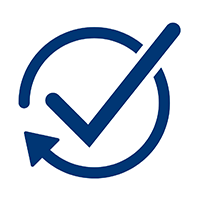
This section of the WNSWLHD Quality Account outlines the planning processes undertaken during the year to identify priority initiatives and the governance structure in place to support continuous improvement.
We have highlighted some of our achievements in safety and quality and included a summary of the initiatives undertaken, activities, outcomes, measures of change and actions to sustain achievements.
WNSWLHD Clinical Governance Framework aims to ensure that all patients and consumers receive safe and high-quality health care within our District, by describing the elements that are essential for all the health services to achieve integrated corporate and clinical governance systems. Through these systems, we can ensure an improved quality of care and patient outcomes.
The District has in place a committee structure that facilitates oversight of safety and quality performance, and provides mechanisms for escalation, resolution and feedback on identified safety and quality issues.
The role of the Board is focused on leading, directing and monitoring the activities of the Local Health District and driving overall performance.
The District’s Health Care Quality Committee is a Board subcommittee that has responsibility for ensuring that the District has appropriate patient safety and clinical quality systems in place to monitor performance relating to quality and safety, and to continuously improve patient care.
REACH - improving patients, families and carer escalating care
REACH is a process where patients, families and carers can escalate their concerns early, if they are worried about their condition or the care provided.
REACH stands for Recognise, Engage, Act, Call, Help is on its way.
A number of strategies were implemented to improve usage and awareness of the REACH escalation process in WNSWLHD.
The project strategies were implemented across all 39 facilities within WNSWLHD:
- Standardised consumer resources
- Developing and implementing a WNSWLHD specific REACH Video
- REACH QR code for quick consumer access to the video
- REACH resources embedded in patient information resources on admission to facilities and within the facilities themselves
- REACH was embedded into the WNSWLHD escalation procedure 'Clinical Emergency Response System (CERS) including REACH'. This allowed a standardised governance structure for all staff to understand their role in REACH.
- REACH was added to ALL CERS charts within WNSWLHD
- All staff education on the REACH process
Over a 3-year period there has been an increase of REACH calls
- 55 calls in 2021, of which nine were Aboriginal or Torres Strait islander identified patients
- 89 calls in 2022, of which 20 were Aboriginal or Torres Strait islander identified patients
- 152 calls in 2023, of which 31 were Aboriginal or Torres Strait islander identified patients
About REACH
Patients, their families and carers can alert staff to a change in a clinical condition or raise concerns they may have about clinical care by using the REACH program...
Related links:
Rural Nurse Led Heart Failure Clinic
Dubbo Health Service in partnership with the Agency for Clinical Innovation, conducted clinical audits in 2019 and 2021 of patients admitted with Heart Failure. This resulted in changes to clinical practice and the establishment of a Rural Nurse Led Heart Failure Clinic (RNLHFC), with an aim of improving outcomes for patients admitted to Dubbo Heart Failure reduced Ejection Fraction (HFrEF).
The commencement of a Rural Nurse Led Heart Failure Clinic has improved patient primary outcomes of increased quality of life and self-efficacy for HFrEF patients. This has been followed through with secondary outcomes for the WNSWLHD of decreased readmissions for HFrEF.
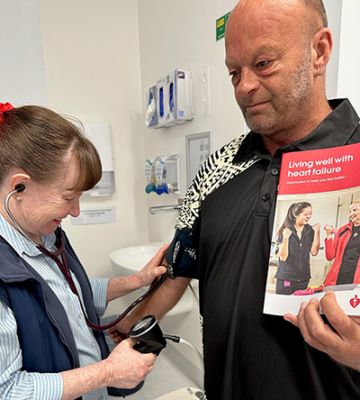
Adult First Seizure Clinic Dubbo
The First Seizure Clinic (FSC) is an innovative, patient-centred project that reduces the challenges faced by adult patients experiencing their first seizure. A restructured, simplified process provides prompt access to investigations and specialist medical and nursing consultations.
Traditionally these patients endure long hours in an emergency department (ED), often leading to hospital admission and subsequent referrals to various healthcare professionals, which can be hindered by access barriers like the chronic shortage of General Practitioners and Neurologists, the need to navigate complex systems to organise tests, as well as a financial costs. These factors reduce the likelihood that patients will complete appropriate investigations and treatments.
FSC bypasses this through direct referral from the ED to access all necessary tests and consultations, which accelerates decision making and eases the burden of navigating the healthcare system. Although the clinic’s emphasis is on enhancing accessibility to initial diagnosis and prompt treatment, patients also receive comprehensive education - a pivotal step towards empowering patients to manage their own chronic health condition. The clinic encourages attendance of a support person, fostering a collaborative approach and providing the opportunity to teach seizure first aid to relatives and carers.
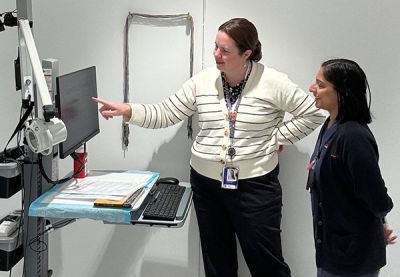
Cervical Screening During Pregnancy Dubbo
The aim of this project was to provide cervical screening for 70% of eligible women receiving antenatal care at Dubbo Hospital Maternity Unit, which aligns with the goals of the World Health Organisation.
Improvement science was used as the framework for exploring change ideas. A review revealed 276 missed opportunities for screening amongst women who had their first antenatal appointment between 1/1/23 and 30/6/23. 50% of women with a screen that returned an abnormal result did not know what that result was. Only 6 screens were initiated by midwives between January 2020 and Dec 2023.
During the testing period (21/8/2023 to 30/4/2024) 234 cervical screening tests were performed. For eligible women who had their first antenatal appointment in February 2024, 76.4% have thus far received cervical screening. 68 testing occasions required follow-up sooner than the normal 5-year schedule.
This project has served to integrate cervical screening into midwifery care at Dubbo Hospital, such that women are receiving cancer-prevention screening that would otherwise be overlooked.
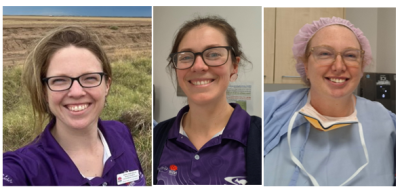
Helping hands at Orange Health Service – Constraint Induced Movement Therapy
This project aimed to ensure all stroke survivors with upper limb (UL) difficulties admitted to Orange Health Service (OHS) Rehabilitation Unit were provided with care that meets the Australian and New Zealand clinical guidelines for stroke management. That is, that they have collaboratively developed goals set and reviewed and are provided with constraint induced movement therapy (CIMT).
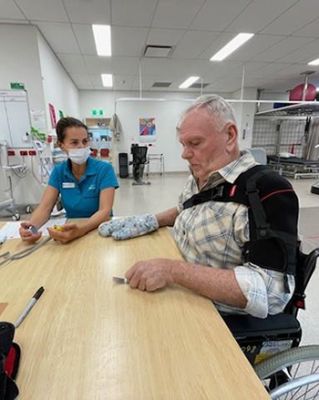
Research has found CIMT to be superior to other forms of UL rehabilitation at improving UL function post stroke. This quality improvement project substantially improved UL goal setting and achievement.
In 2023/2024:
- 85% of eligible stroke survivors were offered CIMT (vs 15% in 2018/2019),
- 100% had UL goals established (vs 50% in 2018/2019),
- 93% had objective UL outcome measures completed (vs 28% in 2018/2019), and
- 60% achieved their goals.
The helping hands of OHS Rehabilitation staff have successfully improved post stroke UL outcomes.
Tuning into kids
Emotion coaching and emotional regulation are key skills for parents and children that enhance emotional wellbeing and significantly reduce the risk of future mental health and associated problems.
Tuning In To Kids is an evidence based, six-week, Australian developed program that supports parents in learning new skills in emotion coaching and emotion regulation. The Rural Psychology Service had identified a need for the program as a Primary Mental Health Prevention that was lacking, particularly in rural and remote parts of WNSWLHD.
The psychologists in this service have acquired accreditation to run the program and have successfully implemented this via a telehealth model on five occasions in 2023/24 with parents.
The results have been very positive for parents in both developing and implementing skills to benefit their children in developing emotional intelligence, improved emotional and behavioural regulation and improved family relationships.
The program is continuing to be run as a sustainable, district-wide initiative utilising telehealth.
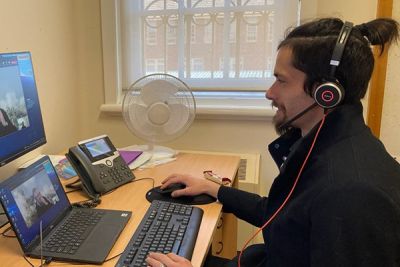
Right time, right place - innovative collaboration to connect women from Western NSW to world class cancer treatment
This project is a collaboration between the oncology teams at Western Cancer Centre Dubbo (WCCD) and Royal North Shore Hospital (RNSH). It has resulted in a comprehensive radiation oncology treatment pathway for Aboriginal patients with gynaecological cancers presenting to WCCD, with a focus on cultural awareness and support.
This project places Aboriginal women and their cultural, emotional, and healthcare needs at the core of its framework, ensuring they receive value-based healthcare throughout their clinical pathways. The services are co-designed and work closely with Aboriginal Care Coordinators and Liaison Officers to ensure the patient experience is consistently evaluated from initial referral and consultation through to follow-up and aftercare.
The incidence of cervical cancer among Aboriginal women is double that of non-Aboriginal women, with a mortality rate four times higher, according to the Cancer Council 2024. To address this, comprehensive treatment schedules include 25 treatments of external beam radiotherapy available within WNSWLHD, combined with brachytherapy from a metropolitan hospital. Clinical protocols suggest higher cure rates when all treatments are completed within 50 days.
Aboriginal Care Coordinators assist patients with socio-economic and health literacy needs. They meet patients at initial consults, simulation, and first-day appointments, and interact daily to alleviate complexities and minimise non-compliance.
The collaboration has allowed patients access to treatment options such as brachytherapy (sub-specialist area of radiation oncology), whilst providing culturally supportive education sessions for patients and health professionals.
This process has been successfully delivered to gynaecological patients from Western NSW with positive outcomes.
Mawang
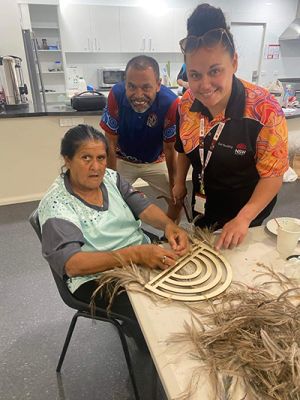
Improvement in health outcomes is achieved by providing a culturally safe and accessible community driven mental health drug and alcohol outreach service.
Mawang was established as a way to build trust and strengthen relationships between WNSWLHD and community members who are hesitant to attend formal health facilities, particularly Aboriginal community members.
Mawang is a weekly group community session focusing on social, emotional, physical and mental wellbeing. The group is led by the Mental Health and Drug and Alcohol (MHDA) team in partnership with Aboriginal health workers and provides cultural activities alongside clinical practice, to aid healing.
Since November 2022, 1213 people have registered their attendance at Mawang. 77% of attendees identify as Aboriginal or Torres Strait Islander and 51 people have formally sought referral to and information about MHDA services through Mawang. Of particular note, there has been a 7% increase in the number of older people accessing mental health services since Mawang commenced.
Gook-int-ji-Nhuungku (pronounced Gookandgee noon-go)
Aboriginal women play a huge role in the kinship society. A successful application for Indigenous Education Funds from Health Services Union, and additional funding from WNSWLHD, Bourke Aboriginal Community Health Service (BACHS) and Maranguka Hub allowed for a collaborative project between Aboriginal women, health staff and sponsors, to create a forum to address the health inequalities in the Bourke community. Bourke Aboriginal women wanted to write their own narrative and be allowed to shape and determine their own future.
Initially gatherings were a platform to listen to Aboriginal women that have paved the way forward to self-determination and showcase their achievements and life stories in senior leadership roles across NSW. This was an opportunity for those women to share how they have overcome their adversities and give back to the community through empowerment, leadership and their culture.
The project had 5 elements:
- Monthly Health Yarning sessions at BACHS, where Aboriginal women shared their stories
- A two-day healing camp at Trilby Station focused on social and emotional wellbeing, following so much grief in the Bourke community
- A teo-day women’s conference in Bourke, with more than 100 women in attendance
- A wellness trip to Sydney
- A photo collage of the Bourke Aboriginal women.
The attendance of NSW Health Secretary, Susan Pearce, who engaged, mingled and stayed for the two days of the gathering was a highlight. This was a major triumph and highlighted the commitment of NSW Health to the Bourke community and remote health.
Bourke has commenced designing the 2024/2025 Healing Camp and Women’s Gathering again, due to responses and the excessive amount of Sorry Business in the community. Brewarrina community is designing and implementing a Women’s Gathering in October 2024 and Three River’s Assembly and REDi also held an Aboriginal Women’s Gathering in July 2024 in Dubbo.
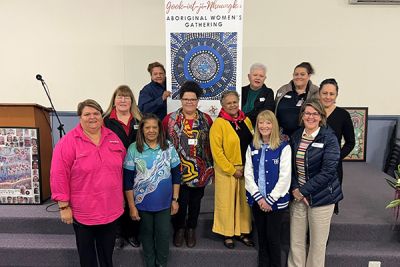
Aboriginal Breastfeeding Resources
Western NSW covers a large geographical area requiring some Aboriginal women and their families to travel long distances to access birthing facilities and will birth off country. This removes them from their known local supports which they have in place.
Aboriginal Maternal and Infant Health Services (AMIHS) data demonstrates our local breastfeeding rates decline rapidly in the postpartum period. During pregnancy the woman intends to breastfeed her baby, initiating at birth but by 6 weeks postpartum the baby is receiving a milk substitute. During the postpartum period information collected through client interactions by the AMIHS teams suggested reasons can include incorrect advice, myths and not knowing where to go for help. In addition, Aboriginal babies are more likely to require tertiary level services and have access to the breastmilk bank.
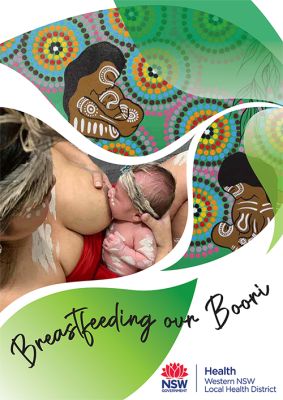
AMIHS teams in WNSWLHD have identified a gap in the availability of culturally sensitive breastfeeding resources and therefore developed new material, the Breastfeeding our Boori booklet.
These culturally sensitive breastfeeding resources, showing beautiful images of local mothers, have helped to improve breastfeeding rates amongst Aboriginal women in WNSWLHD. The booklet is also available as an online version, to help more women access the information.
Related links:
Arogya - Dubbo’s migrant community
The AROGYA (Hindi for good health and wellbeing) project emerged from a profound realisation of the healthcare disparities faced by migrants in Dubbo. Older migrants living in Dubbo and caring for their families often have limited English, significantly impacting their access to treatment and care.
The project focused on addressing these disparities through a culturally sensitive approach. AROGYA aims to provide an avenue to access health information and support and raise awareness about the unique healthcare needs of Dubbo’s migrant population.
AROGYA is delivered through monthly afternoon health information sessions. The program is co-designed with the community and promoted through multicultural community networks. Each session consists of a health education topic, healthy afternoon tea, basic health checks and an optional craft activity to encourage gentle movement and decrease social isolation.
Over 200 health checks have been provided in 6 months. Information sessions include falls prevention, smoking and vaping, diabetes, healthy eating and mental health and wellbeing. Additionally, participants were supported to access services including breast screening, diabetes educators and GPs.
Collaborating with committed stakeholders, the project has developed a platform to engage with migrant families, providing health information and supporting health and wellbeing whilst building social connectedness.
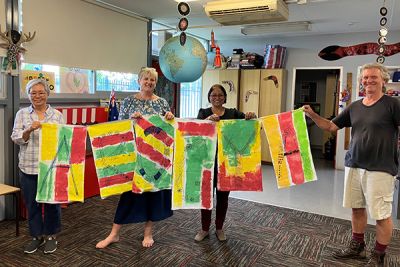
Improving the patient experience
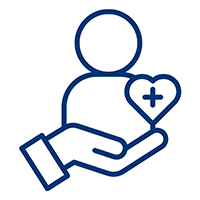
This section of the WNSWLHD Quality Account outlines how patient experience and feedback is captured and responded to.
We have highlighted some examples of:
- Partnering with patients, consumers and carers in shared decision making and/or the co-design of services.
- Community participation in a safety and quality improvement initiative.
Innovate to Elevate: Amplifying voices to inspire hope and shifting from surviving to thriving
During the week (29 April to 3 May 2024), WNSWLHD celebrate exceptional patient and staff experiences by inviting and sharing stories to amplify voices and inspire hope. NSW Health is dedicated to ensuring that the people in our care, along with their families and carers, and our staff have the best possible experiences.
WNSWLHD Mental Health team hosted an ‘Afternoon with the Arts’ on Bloomfield Campus in Orange. Carers and consumers enjoyed the opportunity to celebrate consumer led artworks, ceramics and poetry.
The Bloomfield Choir, in collaboration with the Orange Conservatorium, enthralled the crowd of staff, community and consumers. Human Experience Week celebrations provided opportunity for a lovely afternoon showcasing the creativity of our Mental Health and Drug and Alcohol consumers, with some prizes for participation!
55 people also joined the 'Meet the Consumer and Carer Consultancy Group' and the 'Peer Workforce Forum' was held in Dubbo with 25 peer workers coming together to learn and connect to the broader peer workforce team from across Mental Health and Drug and Alcohol.
Using outcome measures to empower Aboriginal patients and connect
Patient Reported Measures (PRMs) is a program enabling patients to provide direct, timely feedback about their health-related outcomes and experience, to help drive improvement and integration of healthcare across NSW. The WNSWLHD PRMs team identified an opportunity to lead the state in a population-based approach, using PRMs to better meet the needs of Aboriginal and Torres Strait Islander patients in our district.
The collection and utilisation of PRMs in WNSWLHD Aboriginal Health was low and an alternate approach was needed. The development of a different approach to implementing PRMs aimed to understand patient reported drivers that improve health outcomes for Aboriginal and Torres Strait Islander patients in WNSWLHD.
The current approach to state-wide program implementation has varying relevance to rural, remote, and regional populations and often does not have a ‘best fit’ with local needs, priorities, and populations. This, coupled with concerns around the approved outcome (PROM) tools applicability and cultural relevance, led the team (in collaboration with more than 40 Aboriginal health workers and practitioners) to develop and implement a more culturally mature and fit-for-purpose PROM tool.
Since this project started and changes were developed and adopted, there has been an extra 34 Aboriginal health practitioners and health workers collecting PRMs across the LHD and over 350 PRMs have been completed, an increase of more than 900%.
The development and utilisation of the PRMs has ensured a whole-of-person, holistic approach to ensure care is valuable and meaningful from a patient perspective.
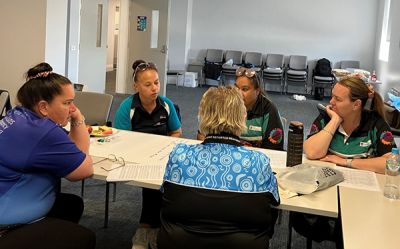
First experience, lasting impression - Paediatric clothing pool, Dubbo
The project aimed to ensure paediatric patients leave the hospital feeling respected and cared for by addressing a crucial aspect of their hospital stay: personal belongings and clothing. Nursing staff observed that many paediatric patients arrived with limited or no personal items, so sought to alleviate the significant stress and shame experienced by parents and the discomfort faced by the children.
Patients were provided with hospital gowns, which were unpopular among the children, who often refused to wear them, leaving them with the unappealing option of their soiled clothes. The discomfort with hospital gowns led children to hide under bed covers, avoiding essential activities like walking to the toilet, sitting out of bed to eat, or engaging in activities.
The project involved creating a clothing pool from donated second-hand children's clothing by staff. A rigorous selection, hygiene, cleaning, and storage process was established to ensure the clothing met the hospital's infection prevention and control standards.
Results have been profound:
- children more active,
- playing in the garden,
- moving around the ward instead of hiding in their beds.
They will remember a medical experience where they felt valued and heard, building a positive relationship between young patients and the healthcare system.
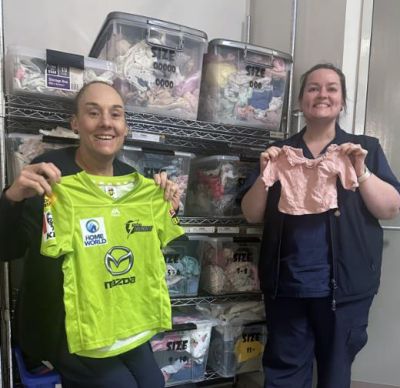
Occupational therapy in the ED
In Western NSW, a trial of Occupational Therapy (OT) was conducted in the Emergency Departments (ED) of Orange, Bathurst, and Mudgee Hospitals over three months from July 2023 as part of the District's Winter Strategy. The aim was to enhance early discharge planning and reduce hospital admissions for patients aged 65 and over by providing timely OT interventions during the winter period, which sees a spike in presentations from this age group.
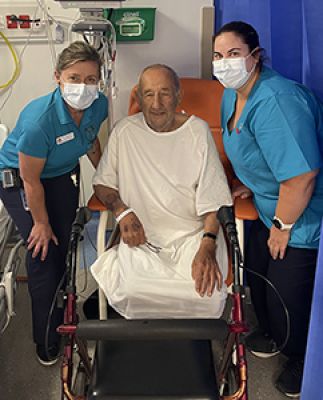
The trial involved implementing a seven-day-a-week OT roster in the ED to facilitate early assessment, intervention, and planning for patients aged 65 and over. The effectiveness was measured by monitoring the Emergency Treatment Performance (ETP) for admitted patients over 65, with the target being to keep the ETP for this age group above 9.3% and to reduce monthly admissions for those over 65 to below 517.
Results indicated an increase in the number of patients discharged within four hours for both age groups since the OT's introduction. Feedback from staff and patients revealed that the OT role positively impacted the patient experience and improved staff understanding of OT's role in patient care. Overall, incorporating an Occupational Therapist in the ED successfully met the ETP targets across all three facilities.
Breast cancer survivorship
To boost patients' confidence in exercise and living well after breast cancer treatment, an exercise-based education group was set up in Mudgee. Patients were selected for the program after completing active treatment, when preparing for discharge from cancer services.
A 4-week programme included weekly short education sessions designed to meet the needs of the group, such as:
- breast cancer treatment summaries,
- nutrition,
- cardiac health,
- lymphoedema,
- managing emotions post treatment, and
- improving sleep.
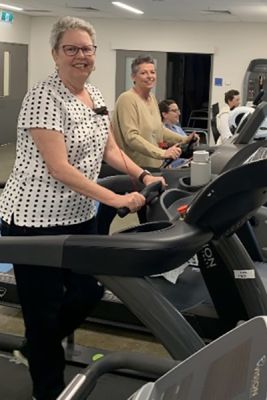
There was also weekly gym session supervised by physiotherapy, including individualised home exercises and education on exercise, as well as a physical assessment and survey pre and post group.
100% of participants met the Clinical Oncology Society of Australia guidelines for physical activity (Cormie 2018) post programme, 0% of participants prior.
All participants improved overall fitness, upper and lower limb strength on post programme assessment. Data indicated the group met patients’ needs for exercise, meeting new people, information from health professionals and relieving social isolation post treatment. Staff confidence in patients’ readiness for discharge increased.
Workplace culture that drives safe and quality care

This section of the WNSWLHD Quality Account describes the workplace culture or capability building initiatives being undertaken to support behaviours that foster safe, high-quality care.
WNSWLHD recognises that it is a simple human need to feel valued and appreciated. It is not always about the big wins and the big awards.
To acknowledge these often overlooked small actions, an opportunity for any staff member in our LHD to call out positive behaviours and goings-on amongst their peers was created. It is an opportunity to celebrate achievements, milestones and the people behind them, no matter where in the district staff might be or what role they occupy.
Coinciding with the launch of ‘Gratitude in Action’ in May 2024, a Mindful May ‘Activity a Day’ calendar was introduced. Each day suggested a great activity to try or new way to incorporate mindfulness into the day. Examples included starting gratitude journals, stretches to do at a computer and positive affirmations.
Allied Health Rural Graduate Program
The Allied Health Rural Graduate Program (AHRGP) commenced in 2023 as a pilot initiative under the People Strategy (5.24) to facilitate recruitment and retention of allied health professionals in WNSWLHD. The AHRGP is a structured two-year program that supports allied health graduates as they transition to the workplace and develop rural generalist clinical skills. The program is committed to strengthening our future allied health workforce.
15 allied health graduates in five disciplines (dietetics, occupational therapy, physiotherapy, social work, and speech pathology) commenced in supernumerary positions across Bathurst, Orange, and Dubbo in February 2023. The program was refined in its first year to include an annual intake. A second intake of four graduates commenced at Dubbo Health Service in 2024. The program has achieved an 80% retention rate in its first 12 months, which is commensurate with retention in the District's GradStart nursing program.
The AHRGP has been expanded to provide support, networking, and education to allied health graduates who have recently commenced their professional careers across the District in 2023-2024. The AHRGP currently supports 50 allied health graduates across eight allied health disciplines (including pharmacy, psychology, and radiation therapy in 2024) and seven District sites.
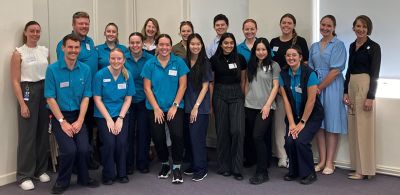
International registered nurse orientation program
The establishment of CREST-Sim stemmed from innovative thinking to improve education, simulation, training and support for WNSWLHD nurses, addressing the limited capacity at local facilities. Existing programs did not meet the unique needs of nurses in rural and remote areas, particularly for virtual health services.
The International RN Orientation Program at CREST-Sim offers immersive, simulation-based education using realistic clinical scenarios, manikins, standardised patients, and part-task trainers. Training includes cultural assimilation to enhance understanding and respect for Aboriginal culture.
The program equips international RNs with essential skills and confidence, facilitating their transition into rural and remote roles. This reduces clinical risks, improves patient safety, and addresses unique learning needs, resulting in higher retention rates and less stress among nurses.
CREST-Sim fills gaps in traditional orientation programs, enhancing the readiness and retention of international nurses in rural and remote settings. It supports facility managers by enabling quicker staff integration, leading to high-quality care. Overall, CREST-Sim ensures well-prepared, confident clinical staff, improving patient outcomes.
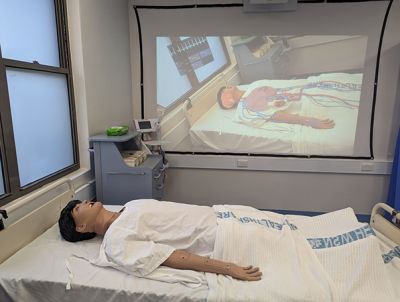
Enrolled nurse cadetship
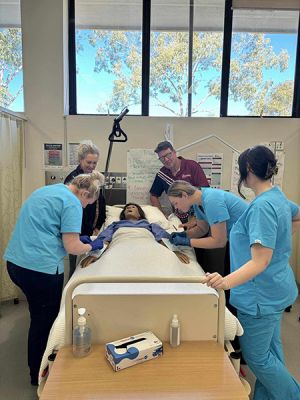
The WNSWLHD Enrolled Nursing (EN) Cadetship offers an innovative program to support undergraduate students enrolled in Diploma of Nursing course, in collaborative partnership with TAFE NSW. Being a first of its kind program in NSW Health, the EN cadetship is an integral part of the LHD’s workforce strategies to ‘grow our own’ and provide career pathways for local people.
The aim is to ensure the LHD has a skilled and sustainable workforce by engaging with school students, rural and remote students, and education providers to establish health career pipelines for local residents.
The program provides a study allowance of $300 per week for 40 weeks. Cadets also receive 55 days paid work placement to consolidate nursing theoretical knowledge and clinical skills whilst working within the scope of student enrolled nurse.
The program, which runs over 18 months, has assisted in attracting and retaining skilled nurses.
In 2023 we recruited seven EN cadets 75% are on track to graduate in November 2024 with 100% being offered ongoing employment in WNSWLHD. Cadets commented it provided an opportunity to learn practical things in a clinical setting. In 2024 we have successfully recruited 10 cadets of which three identify as Aboriginal.
Related Links
Review of performance against NSW Health KPIs

This section of the WNSWLHD Quality Account demonstrates how we have performed based on key performance indicators (KPIs) set by NSW Health.
WNSWLHD regularly monitors performance against large number of KPIs through many committees and working groups, including the WNSWLHD Health Care Quality Committee. This regular monitoring allows trends and gaps in process to be identified so that quality improvement initiatives can be put in place to improve patient safety.
Listed below is the performance information and data for 2023-24.
| Performance Area | Target Achieved |
|---|---|
| Childhood Obesity: Children with height and weight recorded target is 70%. WNSWLHD has improved on last year reaching 83.5% between April and June 2024. | Yes |
| Percentage of children fully immunised at one year of age is above the target of 95% at 94.9%. | Yes |
| The percentage of Aboriginal women smoking during pregnancy target is 43.8% with WNSW performing against this at 43% for the 2023/2024 financial year. WNSWLHD was below target of 11.2% for Non-Aboriginal women at 9.3%. | Yes |
| The target of 20% for ‘Get Healthy in Pregnancy’ referrals was not met with 16.9% of women receiving referrals but was an improvement on the previous year. | No |
| Hospital Drug and Alcohol Consultation Liaison consultations had a target of 725 for WNSWLHD. A total of 312 consultations were recorded for this year. | No |
| The target for LHD residents initiating Hepatitis C direct acting antiviral treatments was 180. The total was 53 for WNSWLHD. | No |
| WNSWLHD exceeded the target of 67 for Aboriginal paediatric patients undergoing otitis media procedures at 84. | Yes |
| The target for the delivery of the 1-4 week health check is 85% with WNSWLHD exceeding the target at 91.3% in the first quarter of 2024. | Yes |
| The Breast Screen participation target of 50% for women 50-74 years was met at 58.6%. | Yes |
| Performance Area | Target Achieved |
|---|---|
| WNSWLHD performed better than the targeted 27.9% for potentially preventable hospital services at 25%. | Yes |
| The target for Mental health acute readmission within 28 days is less than 13%. WNSWLHD performed well at 7.6%. | Yes |
| Mental health peer Workforce employment full time equivalents (FTE) target is 22.6 with WNSW not quite meeting this at 21.4. Noting the previous year’s target was 14.6 which WNSWLHD exceed reaching 20.5. | Yes |
| Domestic and family violence screen reached 63.7% which was below the target of 70%. | No |
| Mental Health Acute post-discharge community care follow up within 7 days was under the 75% target at 63%. | No |
| The target of 57% for electronic discharge summaries completed was met at 58.3%. | Yes |
| Performance Area | Target Achieved |
|---|---|
| The target for total time in ED is less than 4 hours with the average in WNSWLHD at 4.3 hours. | No |
| The target for mental health ED extended stays (greater than 24 hours) is 0. WNSWLHD saw 138 instances in the year. | No |
| 100% of patients had a triage 1 of less than 2 minutes. | Yes |
| The target for triage 2 less than 10 minutes is 80%. WNSWLHD reached 80.9%. | Yes |
| The target for triage 3 less than 30 minutes is 75%. WNSWLHD reached 80%. | Yes |
| Patients transferred from an ambulance to ED within 30 minutes was below the target of 90% at 81.9%. | Yes |
| Performance Area | Target Achieved |
|---|---|
The following Hospital Acquired Complications were below target:
| Yes |
The following Hospital Acquired Complications were above target:
| No |
| The KPI for being seen within the recommended time frame for the 3 surgical categories is 100%. WNSWLHD reached 99.9% in category 1, 86.5% in category 2 and 85% in category 3. | No |
| Elective surgery patients treated on time for category 1 was 99.9% with a target to 100%. Category 2 was 86.9% with a target of 97% and category 3 85.2% with a target of 97%. | No |
| The mental health acute seclusion duration average target is 4 hours. WNSWLHD limited seclusion duration averaging 0.8hours. The frequency achieved by WNSWLHD of 1.6% was below the target of 4.1%. | Yes |
| The target for involuntary patients absconded is 0.8 per 1000 bed days. WNSWLHD was below this target at 0.8. | Yes |
| The mental health consumer experience score of very good or excellent target is 80%. WNSWLHD achieved 69%. | No |
| The WNSWLHD Aboriginal workforce participation target is 9.4%. WNSWLHD has increased to 7.55% this year. | No |
| The target for unplanned hospital readmissions within 28 days of separation is 4.6% for all patients. WNSWLHD saw 4.9% of readmissions for all patients. | No |
| The target for unplanned hospital readmissions within 28 days of separation is 5.4% for Aboriginal patients. WNSWLHD saw 5.3% for Aboriginal patients. | Yes |
| 1.7% of Aboriginal patients discharged against medical advice is above the target of 1%. | No |
| 76% of adult admitted patients and 62% adult patients in ED rated their overall patient experience as excellent. | No |
| Performance Area | Target Achieved |
|---|---|
| The People Matter Survey Wellbeing score sits at 52% | Yes |
| Take Action as a result of the survey has remained at 41% since 2022. | Yes |
| The people matter survey engagement total score sits at 64% unchanged from 2022 | Yes |
According to the people matter survey, racism experienced by staff was 8% in 2023. Internationally qualified registered nurses have a 4 week induction at CREST-Sim and receive a welcome handbook as a way of introduction to Australian culture. Civility and Respect training is conducted by the Employee Assistance Program and Staff Experience Leads. Psychosocial safety is a focus through the job demand checklists. There is a Diversity, Inclusion, Belonging working group to reduce discrimination in the LHD. | No |
| 63.1% of eligible employees have had a performance review in the last 12 months which is an increase on the previous year | No |
| Average time taken from request to recruit to decision to approve/decline/defer is 6.79 business days witch is below the target of 10 days | Yes |
| WNSWLHD is exceeding the Aboriginal Workforce Participation target of 3%, at 7.8% for 2022/2023. | Yes |
| There was a reduction of 3.9% of compensable workplace injury claims from 22/23 to 23/24. | No |
| The average for research governance application authorisations was 28.9 days. | Yes |
Future safety and quality priorities

This section of the WNSWLHD Quality Account describes some of our safety and quality priorities for the next 12 months, including some that focus on improving health outcomes for First Nations people.
Sustainability
The WNSWLHD Environmental Sustainability Strategy was published in April 2023. One of the actions from the Strategy was to establish a Sustainability Development Unit (SDU) and this team now consists of a manager and project officer.
Work is in progress across WNSWLHD to reduce carbon emissions. Projects, small and large, are being implemented to help meet both government and LHD targets, Ministry KPI’s and to promote sustainability across WNSWLHD.
Some of these projects include:
Redistributing Excess PPE - During the Covid pandemic excess PPE was delivered to our small MPS sites from the federal government. So far $30,000 of excess stoke has been distributed to larger facilities. This has resulted in one ton of waste being diverted from landfill which is equivalent to 1.6 tons of Co2e being released into the atmosphere.
An additional $280,000 of PPE has been identified. An interactive inventory has been developed for managers to monitor stock and coordinate its redistribution.
PPE that has expired has been donated to Schools, Veterinary Clinics, Rural Fire Services, Childcare Centres, Butchers, Farmers and Creative Arts.
- Blayney Food Waste - Food waste is being collected from Blayney MPS by a local farmer used as chicken feed. The compost is being used on the farmer’s garden with the plan to donate the plants to the redeveloped Blayney MPS and Child Adolescent Mental Health Unit Community Garden to complete the circular economy.
- Electric Vehicles - The LHD now has four EV’s in its fleet. These vehicles are being used to deliver outreach services in the community. EV chargers have been installed in Dubbo, Parkes, and Orange to support WNSWLHD increasing its EV fleet in the future.
- Solar Panels - The second largest solar PV installation in any government facility in NSW is underway at Orange Health Service. More than 3,300 solar panels have been installed on the roofs of buildings across the Orange and Bloomfield Hospital campus which will result in the reduction of almost 2,300 tonnes of carbon emissions each year which is equivalent to the power used to power around 500 homes. It is planned that the solar panels will be switched on later in 2024.
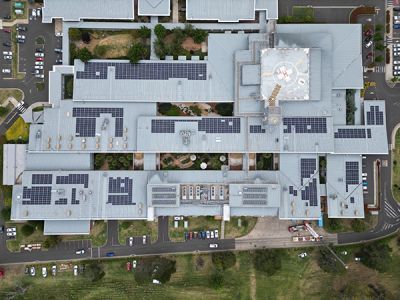
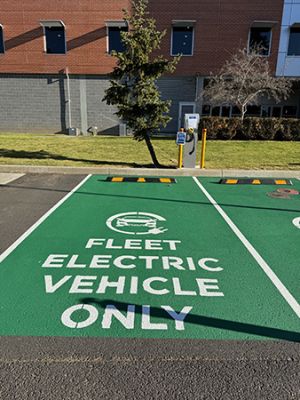
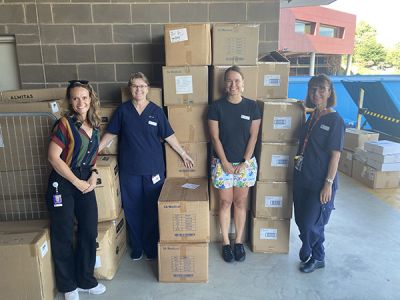
To support the implementation of the NSW LGBTIQ+ Health State Strategy within Local Health Districts, the MOH provided funding through the 'Flexible Funds Project – Funding Pool'. As part of this initiative, WNSWLHD received $130,000, which funded a project to scope the safety and accessibility of WNSWLHD for consumers and staff. Given the novelty and prevalent misinformation surrounding this work within WNSWLHD, as identified in the Staff Pre-Scoping Survey, it was essential to establish a solid understanding of what was working well, identify existing gaps, determine consumer needs, and assess how staff viewed effective implementation of this strategy within a local context.
Within this process, consultations were conducted with consumers, staff, and NGO providers. The pre-scoping survey received responses from 166 staff members, while 48 consumers participated in a community-based survey. Additionally, 103 individuals from all three groups attended and contributed to focus groups. This consultation approach assessed the needs of both consumers and staff, evaluating the feasibility of staff meeting these needs and identifying the best forms of implementation.
From this co-design process, tangible strategies were identified and consolidated into a recommendations report, outlining 15 recommendations and 48 actionable sub-recommendations for the LHD to implement. Recommendations were prioritised based on their importance to focus group participants, their potential impact, and the logical sequence of implementation taking into consideration key dependencies of certain tasks.
These recommendations will be implemented over the next 24 months in the form of a project, at the expense of the LHD. This not only demonstrates WNSWLHD's commitment to diversity, inclusion and belonging, but it also reinforms our shared goal, of ‘Healthier rural people, thriving communities’.
The implementation aim ‘To improve the patient and staff experience for LGBTIQ+ peoples within all areas of WNSWLHD, by raising the capacity of all staff, improving systems, and strengthening partnerships.’ Implementation will begin toward the end of 2024.
Listening to kids. Paediatric Patient Experience Survey
Patient Experience is increasingly being recognised as an important indicator of the quality of healthcare within hospitals and health systems. Forming a core component of the quadruple aim, Patient Experience is associated with measures of patient safety and clinical effectiveness and has substantial evidence to link it to patient safety and hospital utilisation. Measuring patient experience alongside these components provides a more comprehensive picture of healthcare quality and can highlight areas for improvement.
WNSWLHD has a well-established and robust Patient Experience system and governance that allows for the measuring of the quality of health care (in parallel to other quality and safety indicators) and offer insights into a dimension that's otherwise difficult to measure objectively. To date, the focus of these has primarily been on adult based service provision in the admitted and emergency space ignoring around a third of the throughout population that are paediatric. Although parents of paediatric patients are routinely surveyed by Bureau of Health Information (BHI) in the Children's Hospital Network, only children over 14 in those hospitals are surveyed and paediatric patients in our LHD are not surveyed by the BHI.
After a structured gap analysis review into the processes within WNSWLHD, the Patient Experience Team commenced a co-design, collaborative process to commence the development and production of a flexible Paediatric Patient Experience Survey (PPES) tool. This tool allows children and young people the opportunity to provide feedback on their experience across the care journey in the inpatient service setting.
Commencing March 2021, a total of 1,839 PPES have been collected by a parent, carer or child. 598 (32.5%) have been completed by the paediatric patient themselves. Of these 598 responses, 72% rated the care received as 'Excellent.' The introduction of this tool provides further opportunities to develop effective improvement strategies based on the feedback received from young people themselves.

Narromine AntiVaping Intervention
In response to community concerns, the Narromine AnitVaping Intervention (NAVI) pilot project was co-designed with local youth and partners to increase awareness about the risks of vaping and provide support to quit. Strategies were developed to improve health literacy around vaping, awareness of the signs of addiction, create vape free environments, promote smoke and vape free legislation, and increase opportunities to access quit support/pathways.
Local stakeholders were responsive. Strategies that have been developed and delivered in response to community co-design include:
- Community engagement and education e.g. NAIDOC, Youth Colour Run
- School strategies: resource development competition for students, School Cessation Support Portfolio, student education workshops
- Smoke and vape free sporting grounds initiatives
- Supporting quit and information pathways and opportunities for professionals to upskill in vaping support
Results so far have indicated that with strong partnerships and collaborative community input, there is the potential to harness community action and engagement to lead to better health outcomes. Health promotion action reducing youth vaping is a community priority.
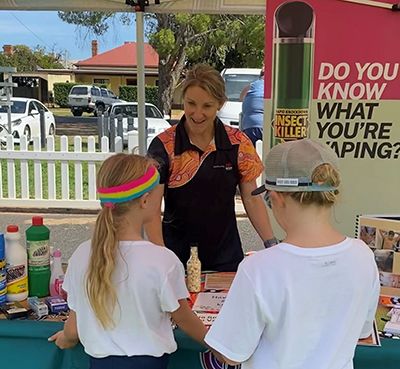
More information and contacts
Thank you for taking the time to read the 2023-2024 Safety and Quality Account.
We are proud to share with you the achievements made in the last 12 months and the work we will continue to progress to provide world class rural health care.
We value your feedback on this Safety and Quality account and please let us know what information you would like included in the future by emailing WNSWLHD-Clinicalgovernance@health.nsw.gov.au.
Annual WNSWLHD Governing Body Attestation Statement
Submission of this attestation statement annually is a pre-requisite to accreditation of the organisation being assessed against the National Safety and Quality Health Service Standards. The WNSWLHD Chief Executive and Board Chair for WNSWLHD signed the Attestation Statement in September 2024.
